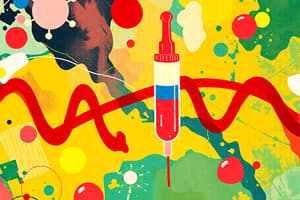Podcast
Questions and Answers
What triggers insulin secretion in response to high blood sugar levels?
What triggers insulin secretion in response to high blood sugar levels?
- Direct sensitivity of beta cells to glucose (correct)
- Glucagon release from the pancreas
- Modification of insulin receptors
- Inhibition by adrenal hormones
Which hormone primarily functions in raising blood sugar levels during hypoglycemia?
Which hormone primarily functions in raising blood sugar levels during hypoglycemia?
- Thyroxine
- Glucagon (correct)
- Adrenaline
- Insulin
What is a common characteristic of insulin-dependent diabetes (DID)?
What is a common characteristic of insulin-dependent diabetes (DID)?
- It is characterized by a lack of insulin secretion (correct)
- It primarily affects adults
- Insulin treatment is ineffective
- It occurs due to receptor modifications
How do protein hormones like insulin and glucagon affect cellular processes?
How do protein hormones like insulin and glucagon affect cellular processes?
In non-insulin-dependent diabetes (DNID), what is primarily affected?
In non-insulin-dependent diabetes (DNID), what is primarily affected?
What is the primary function of insulin in blood glucose regulation?
What is the primary function of insulin in blood glucose regulation?
What effect does glucagon have on blood glucose levels?
What effect does glucagon have on blood glucose levels?
Which process is responsible for the conversion of glucose into glycogen?
Which process is responsible for the conversion of glucose into glycogen?
What triggers the release of glucagon in the body?
What triggers the release of glucagon in the body?
Which of the following is NOT a function of insulin?
Which of the following is NOT a function of insulin?
During fasting, which process is primarily activated to maintain blood glucose levels?
During fasting, which process is primarily activated to maintain blood glucose levels?
Which hormones are primarily responsible for the regulation of blood glucose levels?
Which hormones are primarily responsible for the regulation of blood glucose levels?
What is gluconeogenesis?
What is gluconeogenesis?
Flashcards
Insulin-dependent Diabetes (DID)
Insulin-dependent Diabetes (DID)
This type of diabetes occurs in children and is characterized by a lack of insulin secretion.
Non-insulin-dependent Diabetes (DNID)
Non-insulin-dependent Diabetes (DNID)
This type of diabetes occurs in adults and is characterized by a lack or modification of insulin receptors on target cells.
Insulin
Insulin
This hormone decreases blood sugar levels by promoting glucose uptake into cells.
Glucagon
Glucagon
Signup and view all the flashcards
Blood Sugar Regulation
Blood Sugar Regulation
Signup and view all the flashcards
Blood Glucose Regulation
Blood Glucose Regulation
Signup and view all the flashcards
Blood Glucose
Blood Glucose
Signup and view all the flashcards
Glycogenesis
Glycogenesis
Signup and view all the flashcards
Glycogenolysis
Glycogenolysis
Signup and view all the flashcards
Gluconeogenesis
Gluconeogenesis
Signup and view all the flashcards
Lipolysis
Lipolysis
Signup and view all the flashcards
Study Notes
Blood Glucose Regulation
-
Blood glucose is a vital biological constant for cell function. Normal blood glucose levels fluctuate slightly around 1 g/L; this is higher after meals, and lower during fasting or exercise.
-
Hypoglycemia (low blood sugar) and hyperglycemia (high blood sugar) are deviations from normal blood glucose levels, and the body has mechanisms to maintain homeostasis.
Hormones Involved
-
Insulin is a crucial hormone for regulating blood glucose, specifically by decreasing blood glucose levels. Insulin facilitates the uptake of glucose by cells and promotes glycogen synthesis in the liver and muscles. It's protective against hypoglycemia.
-
Glucagon is another hormone, which increases blood glucose levels by promoting glycogenolysis and gluconeogenesis (synthesis of glucose from non-carbohydrate sources). Glucagon's role is crucial in countering hypoglycemia
Types of Diabetes
-
Type 1 diabetes arises from a lack of insulin production, or from reduced insulin secretion. It usually emerges in childhood or adolescence. Treatment typically involves daily insulin injections.
-
Type 2 diabetes results from resistance to insulin action or reduced insulin secretion. It often develops later in life and can frequently be managed with lifestyle changes.
Studying That Suits You
Use AI to generate personalized quizzes and flashcards to suit your learning preferences.



